#disenshittification
Explore tagged Tumblr posts
Text
Kickstarting a book to end enshittification, because Amazon will not carry it

My next book is The Internet Con: How to Seize the Means of Computation: it’s a Big Tech disassembly manual that explains how to disenshittify the web and bring back the old good internet. The hardcover comes from Verso on Sept 5, but the audiobook comes from me — because Amazon refuses to sell my audio:
https://www.kickstarter.com/projects/doctorow/the-internet-con-how-to-seize-the-means-of-computation
Amazon owns Audible, the monopoly audiobook platform that controls >90% of the audio market. They require mandatory DRM for every book sold, locking those books forever to Amazon’s monopoly platform. If you break up with Amazon, you have to throw away your entire audiobook library.
That’s a hell of a lot of leverage to hand to any company, let alone a rapacious monopoly that ran a program targeting small publishers called “Project Gazelle,” where execs were ordered to attack indie publishers “the way a cheetah would pursue a sickly gazelle”:
https://www.businessinsider.com/sadistic-amazon-treated-book-sellers-the-way-a-cheetah-would-pursue-a-sickly-gazelle-2013-10
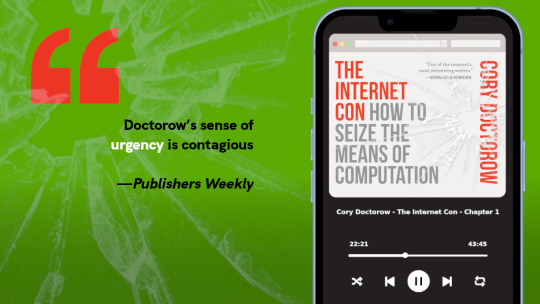
[Image ID: Journalist and novelist Doctorow (Red Team Blues) details a plan for how to break up Big Tech in this impassioned and perceptive manifesto….Doctorow’s sense of urgency is contagious -Publishers Weekly]
I won’t sell my work with DRM, because DRM is key to the enshittification of the internet. Enshittification is why the old, good internet died and became “five giant websites filled with screenshots of the other four” (h/t Tom Eastman). When a tech company can lock in its users and suppliers, it can drain value from both sides, using DRM and other lock-in gimmicks to keep their business even as they grow ever more miserable on the platform.
Here is how platforms die: first, they are good to their users; then they abuse their users to make things better for their business customers; finally, they abuse those business customers to claw back all the value for themselves. Then, they die:
https://pluralistic.net/2023/01/21/potemkin-ai/#hey-guys
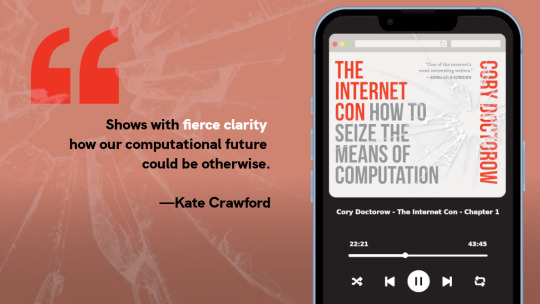
[Image ID: A brilliant barn burner of a book. Cory is one of the sharpest tech critics, and he shows with fierce clarity how our computational future could be otherwise -Kate Crawford, author of The Atlas of AI”]
The Internet Con isn’t just an analysis of where enshittification comes from: it’s a detailed, shovel-ready policy prescription for halting enshittification, throwing it into reverse and bringing back the old, good internet.
How do we do that? With interoperability: the ability to plug new technology into those crapulent, decaying platform. Interop lets you choose which parts of the service you want and block the parts you don’t (think of how an adblocker lets you take the take-it-or-leave “offer” from a website and reply with “How about nah?”):
https://www.eff.org/deeplinks/2019/07/adblocking-how-about-nah
But interop isn’t just about making platforms less terrible — it’s an explosive charge that demolishes walled gardens. With interop, you can leave a social media service, but keep talking to the people who stay. With interop, you can leave your mobile platform, but bring your apps and media with you to a rival’s service. With interop, you can break up with Amazon, and still keep your audiobooks.
So, if interop is so great, why isn’t it everywhere?
Well, it used to be. Interop is how Microsoft became the dominant operating system:
https://www.eff.org/deeplinks/2019/06/adversarial-interoperability-reviving-elegant-weapon-more-civilized-age-slay
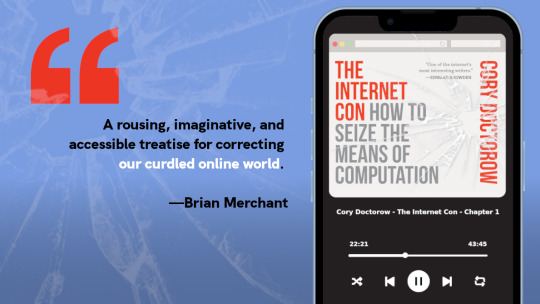
[Image ID: Nobody gets the internet-both the nuts and bolts that make it hum and the laws that shaped it into the mess it is-quite like Cory, and no one’s better qualified to deliver us a user manual for fixing it. That’s The Internet Con: a rousing, imaginative, and accessible treatise for correcting our curdled online world. If you care about the internet, get ready to dedicate yourself to making interoperability a reality. -Brian Merchant, author of Blood in the Machine]
It’s how Apple saved itself from Microsoft’s vicious campaign to destroy it:
https://www.eff.org/deeplinks/2019/06/adversarial-interoperability-reviving-elegant-weapon-more-civilized-age-slay
Every tech giant used interop to grow, and then every tech giant promptly turned around and attacked interoperators. Every pirate wants to be an admiral. When Big Tech did it, that was progress; when you do it back to Big Tech, that’s piracy. The tech giants used their monopoly power to make interop without permission illegal, creating a kind of “felony contempt of business model” (h/t Jay Freeman).
The Internet Con describes how this came to pass, but, more importantly, it tells us how to fix it. It lays out how we can combine different kinds of interop requirements (like the EU’s Digital Markets Act and Massachusetts’s Right to Repair law) with protections for reverse-engineering and other guerrilla tactics to create a system that is strong without being brittle, hard to cheat on and easy to enforce.
What’s more, this book explains how to get these policies: what existing legislative, regulatory and judicial powers can be invoked to make them a reality. Because we are living through the Great Enshittification, and crises erupt every ten seconds, and when those crises occur, the “good ideas lying around” can move from the fringes to the center in an eyeblink:
https://pluralistic.net/2023/06/12/only-a-crisis/#lets-gooooo

[Image ID: Thoughtfully written and patiently presented, The Internet Con explains how the promise of a free and open internet was lost to predatory business practices and the rush to commodify every aspect of our lives. An essential read for anyone that wants to understand how we lost control of our digital spaces and infrastructure to Silicon Valley’s tech giants, and how we can start fighting to get it back. -Tim Maughan, author of INFINITE DETAIL]
After all, we’ve known Big Tech was rotten for years, but we had no idea what to do about it. Every time a Big Tech colossus did something ghastly to millions or billions of people, we tried to fix the tech company. There’s no fixing the tech companies. They need to burn. The way to make users safe from Big Tech predators isn’t to make those predators behave better — it’s to evacuate those users:
https://pluralistic.net/2023/07/18/urban-wildlife-interface/#combustible-walled-gardens
I’ve been campaigning for human rights in the digital world for more than 20 years; I’ve been EFF’s European Director, representing the public interest at the EU, the UN, Westminster, Ottawa and DC. This is the subject I’ve devoted my life to, and I live my principles. I won’t let my books be sold with DRM, which means that Audible won’t carry my audiobooks. My agent tells me that this decision has cost me enough money to pay off my mortgage and put my kid through college. That’s a price I’m willing to pay if it means that my books aren’t enshittification bait.
But not selling on Audible has another cost, one that’s more important to me: a lot of readers prefer audiobooks and 9 out of 10 of those readers start and end their searches on Audible. When they don’t find an author there, they assume no audiobook exists, period. It got so bad I put up an audiobook on Amazon — me, reading an essay, explaining how Audible rips off writers and readers. It’s called “Why None of My Audiobooks Are For Sale on Audible”:
https://pluralistic.net/2022/07/25/can-you-hear-me-now/#acx-ripoff
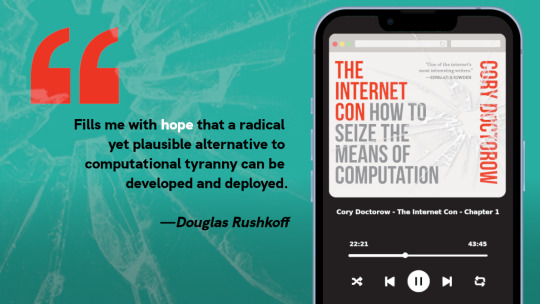
[Image ID: Doctorow has been thinking longer and smarter than anyone else I know about how we create and exchange value in a digital age. -Douglas Rushkoff, author of Present Shock]
To get my audiobooks into readers’ ears, I pre-sell them on Kickstarter. This has been wildly successful, both financially and as a means of getting other prominent authors to break up with Amazon and use crowdfunding to fill the gap. Writers like Brandon Sanderson are doing heroic work, smashing Amazon’s monopoly:
https://www.brandonsanderson.com/guest-editorial-cory-doctorow-is-a-bestselling-author-but-audible-wont-carry-his-audiobooks/
And to be frank, I love audiobooks, too. I swim every day as physio for a chronic pain condition, and I listen to 2–3 books/month on my underwater MP3 player, disappearing into an imaginary world as I scull back and forth in my public pool. I’m able to get those audiobooks on my MP3 player thanks to Libro.fm, a DRM-free store that supports indie booksellers all over the world:
https://blog.libro.fm/a-qa-with-mark-pearson-libro-fm-ceo-and-co-founder/
Producing my own audiobooks has been a dream. Working with Skyboat Media, I’ve gotten narrators like @wilwheaton, Amber Benson, @neil-gaiman and Stefan Rudnicki for my work:
https://craphound.com/shop/

[Image ID: “This book is the instruction manual Big Tech doesn’t want you to read. It deconstructs their crummy products, undemocratic business models, rigged legal regimes, and lies. Crack this book and help build something better. -Astra Taylor, author of Democracy May Not Exist, but We’ll Miss It When Its Gone”]
But for this title, I decided that I would read it myself. After all, I’ve been podcasting since 2006, reading my own work aloud every week or so, even as I traveled the world and gave thousands of speeches about the subject of this book. I was excited (and a little trepedatious) at the prospect, but how could I pass up a chance to work with director Gabrielle de Cuir, who has directed everyone from Anne Hathaway to LeVar Burton to Eric Idle?
Reader, I fucking nailed it. I went back to those daily recordings fully prepared to hate them, but they were good — even great (especially after my engineer John Taylor Williams mastered them). Listen for yourself!
https://archive.org/details/cory_doctorow_internet_con_chapter_01
I hope you’ll consider backing this Kickstarter. If you’ve ever read my free, open access, CC-licensed blog posts and novels, or listened to my podcasts, or come to one of my talks and wished there was a way to say thank you, this is it. These crowdfunders make my DRM-free publishing program viable, even as audiobooks grow more central to a writer’s income and even as a single company takes over nearly the entire audiobook market.
Backers can choose from the DRM-free audiobook, DRM-free ebook (EPUB and MOBI) and a hardcover — including a signed, personalized option, fulfilled through the great LA indie bookstore Book Soup:
https://www.kickstarter.com/projects/doctorow/the-internet-con-how-to-seize-the-means-of-computation
What’s more, these ebooks and audiobooks are unlike any you’ll get anywhere else because they are sold without any terms of service or license agreements. As has been the case since time immemorial, when you buy these books, they’re yours, and you are allowed to do anything with them that copyright law permits — give them away, lend them to friends, or simply read them with any technology you choose.
As with my previous Kickstarters, backers can get their audiobooks delivered with an app (from libro.fm) or as a folder of MP3s. That helps people who struggle with “sideloading,” a process that Apple and Google have made progressively harder, even as they force audiobook and ebook sellers to hand over a 30% app tax on every dollar they make:
https://www.kickstarter.com/projects/doctorow/red-team-blues-another-audiobook-that-amazon-wont-sell/posts/3788112
Enshittification is rotting every layer of the tech stack: mobile, payments, hosting, social, delivery, playback. Every tech company is pulling the rug out from under us, using the chokepoints they built between audiences and speakers, artists and fans, to pick all of our pockets.
The Internet Con isn’t just a lament for the internet we lost — it’s a plan to get it back. I hope you’ll get a copy and share it with the people you love, even as the tech platforms choke off your communities to pad their quarterly numbers.

Next weekend (Aug 4-6), I'll be in Austin for Armadillocon, a science fiction convention, where I'm the Guest of Honor:
https://armadillocon.org/d45/

If you'd like an essay-formatted version of this thread to read or share, here's a link to it on pluralistic.net, my surveillance-free, ad-free, tracker-free blog:
https://pluralistic.net/2023/07/31/seize-the-means-of-computation/#the-internet-con

[Image ID: My forthcoming book 'The Internet Con: How to Seize the Means of Computation' in various editions: Verso hardcover, audiobook displayed on a phone, and ebook displayed on an e-ink reader.]
#pluralistic#trustbusting#big tech#gift guide#kickstarter#the internet con#books#audiobooks#enshitiffication#disenshittification#crowdfunders#seize the means of computation#audible#amazon#verso
15K notes
·
View notes
Text
Google without AI or ads? Yes!
Google added a new search filter that strips out the ads, the AI, and everything except the basic search results.
The filter is: &udm=14
You can type in the new filter into the google search bar, or you can use the website someone made that basically does that part for you (turn it into your default search engine perhaps).
The website is udm14.com (use .org instead, if you want to filter out NSFW results) .
A search filter is text you add to a search to customize the results, such as using -site:twitter.com to remove all search results with a twitter URL or filetype:pdf if you only want links to PDF files.
#google#no ai#anti ai#enshittification#disenshittification#search filters#tech news#search engines#internet
73 notes
·
View notes
Text
I made a thing. Here’s hoping it helps you with your next Google search.
14 notes
·
View notes
Text
for AI free search use the disenshittification konami code:
every time I do a web search, right at the top I have AI info dumping on me
just give me the top result please
97K notes
·
View notes
Text
hey so is it just me that's seeing a pattern here
12ft.io
udm14.com
justtherecipe.com
#it's getting bad huh#disenshittification#enshittification#back in my day... websites were made to be used
1 note
·
View note
Text
If you haven't heard, Google built a bit of a backdoor to access Google without some of the enshittification that's happened over the past 10 years. Not ALL of it, obviously, but at least the AI is gone.
It's easy to set this as your default search engine in your browser's settings if that's what you want to do.
357 notes
·
View notes
Text
You should be using an RSS reader

On OCTOBER 23 at 7PM, I'll be in DECATUR, GEORGIA, presenting my novel THE BEZZLE at EAGLE EYE BOOKS.

No matter how hard we all wish it were otherwise, the sad fact is that there aren't really individual solutions to systemic problems. For example: your personal diligence in recycling will have no meaningful impact on the climate emergency.
I get it. People write to me all the time, they say, "What can I change about my life to fight enshittification, or, at the very least, to reduce the amount of enshittification that I, personally, experience?"
It's frustrating, but my general answer is, "Join a movement. Get involved with a union, with EFF, with the FSF. Tell your Congressional candidate to defend Lina Khan from billionaire Dem donors who want her fired. Do something systemic."
There's very little you can do as a consumer. You're not going to shop your way out of monopoly capitalism. Now that Amazon has destroyed most of the brick-and-mortar and digital stores out of business, boycotting Amazon often just means doing without. The collective action problem of leaving Twitter or Facebook is so insurmountable that you end up stuck there, with a bunch of people you love and rely on, who all love each other, all hate the platform, but can't agree on a day and time to leave or a destination to leave for and so end up stuck there.
I've been experiencing some challenging stuff in my personal life lately and yesterday, I just found myself unable to deal with my usual podcast fare so I tuned into the videos from the very last XOXO, in search of uplifting fare:
https://www.youtube.com/@xoxofest
I found it. Talks by Dan Olson, Cabel Sasser, Ed Yong and many others, especially Molly White:
https://www.youtube.com/watch?v=MTaeVVAvk-c
Molly's talk was so, so good, but when I got to her call to action, I found myself pulling a bit of a face:
But the platforms do not exist without the people, and there are a lot more of us than there are of them. The platforms have installed themselves in a position of power, but they are also vulnerable…
Are the platforms really that vulnerable? The collective action problem is so hard, the switching costs are so high – maybe the fact that "there's a lot more of us than there are of them" is a bug, not a feature. The more of us there are, the thornier our collective action problem and the higher the switching costs, after all.
And then I had a realization: the conduit through which I experience Molly's excellent work is totally enshittification-proof, and the more I use it, the easier it is for everyone to be less enshittified.
This conduit is anti-lock-in, it works for nearly the whole internet. It is surveillance-resistant, far more accessible than the web or any mobile app interface. It is my secret super-power.
It's RSS.
RSS (one of those ancient internet acronyms with multiple definitions, including, but not limited to, "Really Simple Syndication") is an invisible, automatic way for internet-connected systems to public "feeds." For example, rather than reloading the Wired homepage every day and trying to figure out which stories are new (their layout makes this very hard to do!), you can just sign up for Wired's RSS feed, and use an RSS reader to monitor the site and preview new stories the moment they're published. Wired pushes about 600 words from each article into that feed, stripped of the usual stuff that makes Wired nearly impossible to read: no 20-second delay subscription pop-up, text in a font and size of your choosing. You can follow Wired's feed without any cookies, and Wired gets no information about which of its stories you read. Wired doesn't even get to know that you're monitoring its feed.
I don't mean to pick on Wired here. This goes for every news source I follow – from CNN to the New York Times. But RSS isn't just good for the news! It's good for everything. Your friends' blogs? Every blogging platform emits an RSS feed by default. You can follow every one of them in your reader.
Not just blogs. Do you follow a bunch of substackers or other newsletters? They've all got RSS feeds. You can read those newsletters without ever registering in the analytics of the platforms that host them. The text shows up in black and white (not the sadistic, 8-point, 80% grey-on-white type these things all default to). It is always delivered, without any risk of your email provider misclassifying an update as spam:
https://pluralistic.net/2021/10/10/dead-letters/
Did you know that, by default, your email sends information to mailing list platforms about your reading activity? The platform gets to know if you opened the message, and often how far along you've read in it. On top of that, they get all the private information your browser or app leaks about you, including your location. This is unbelievably gross, and you get to bypass all of it, just by reading in RSS.
Are your friends too pithy for a newsletter, preferring to quip on social media? Unfortunately, it's pretty hard to get an RSS feed from Insta/FB/Twitter, but all those new ones that have popped up? They all have feeds. You can follow any Mastodon account (which means you can follow any Threads account) via RSS. Same for Bluesky. That also goes for older platforms, like Tumblr and Medium. There's RSS for Hacker News, and there's a sub-feed for the comments on every story. You can get RSS feeds for the Fedex, UPS and USPS parcels you're awaiting, too.
Your local politician's website probably has an RSS feed. Ditto your state and national reps. There's an RSS feed for each federal agency (the FCC has a great blog!).
Your RSS reader lets you put all these feeds into folders if you want. You can even create automatic folders, based on keywords, or even things like "infrequently updated sites" (I follow a bunch of people via RSS who only update a couple times per year – cough, Danny O'Brien, cough – and never miss a post).
Your RSS reader doesn't (necessarily) have an algorithm. By default, you'll get everything as it appears, in reverse-chronological order.
Does that remind you of anything? Right: this is how social media used to work, before it was enshittified. You can single-handedly disenshittify your experience of virtually the entire web, just by switching to RSS, traveling back in time to the days when Facebook and Twitter were more interested in showing you the things you asked to see, rather than the ads and boosted content someone else would pay to cram into your eyeballs.
Now, you sign up to so many feeds that you're feeling overwhelmed and you want an algorithm to prioritize posts – or recommend content. Lots of RSS readers have some kind of algorithm and recommendation system (I use News, which offers both, though I don't use them – I like the glorious higgeldy-piggeldy of the undifferentiated firehose feed).
But you control the algorithm, you control the recommendations. And if a new RSS reader pops up with an algorithm you're dying to try, you can export all the feeds you follow with a single click, which will generate an OPML file. Then, with one click, you can import that OPML file into any other RSS reader in existence and all your feeds will be seamlessly migrated there. You can delete your old account, or you can even use different readers for different purposes.
You can access RSS in a browser or in an app on your phone (most RSS readers have an app), and they'll sync up, so a story you mark to read later on your phone will be waiting for you the next time you load up your reader in a browser tab, and you won't see the same stories twice (unless you want to, in which case you can mark them as unread).
RSS basically works like social media should work. Using RSS is a chance to visit a utopian future in which the platforms have no power, and all power is vested in publishers, who get to decide what to publish, and in readers, who have total control over what they read and how, without leaking any personal information through the simple act of reading.
And here's the best part: every time you use RSS, you bring that world closer into being! The collective action problem that the publishers and friends and politicians and businesses you care about is caused by the fact that everyone they want to reach is on a platform, so if they leave the platform, they'll lose that community. But the more people who use RSS to follow them, the less they'll depend on the platform.
Unlike those largely useless, performative boycotts of widely used platforms, switching to RSS doesn't require that you give anything up. Not only does switching to RSS let you continue to follow all the newsletters, webpages and social media accounts you're following now, it makes doing so better: more private, more accessible, and less enshittified.
Switching to RSS lets you experience just the good parts of the enshitternet, but that experience is delivered in manner that the new, good internet we're all dying for.
My own newsletter is delivered in fulltext via RSS. If you're reading this as a Mastodon or Twitter thread, on Tumblr or on Medium, or via email, you can get it by RSS instead:
https://pluralistic.net/feed/
Don't worry about which RSS reader you start with. It literally doesn't matter. Remember, you can switch readers with two clicks and take all the feeds you've subscribed to with you! If you want a recommendation, I have nothing but praise for Newsblur, which I've been paying $2/month for since 2011 (!):
https://newsblur.com/
Subscribing to feeds is super-easy, too: the links for RSS feeds are invisibly embedded in web-pages. Just paste the URL of a web-page into your RSS reader's "add feed" box and it'll automagically figure out where the feed lives and add it to your subscriptions.
It's still true that the new, good internet will require a movement to overcome the collective action problems and the legal barriers to disenshittifying things. Almost nothing you do as an individual is going to make a difference.
But using RSS will! Using RSS to follow the stuff that matters to you will have an immediate, profoundly beneficial impact on your own digital life – and it will appreciably, irreversibly nudge the whole internet towards a better state.

Tor Books as just published two new, free LITTLE BROTHER stories: VIGILANT, about creepy surveillance in distance education; and SPILL, about oil pipelines and indigenous landback.


If you'd like an essay-formatted version of this post to read or share, here's a link to it on pluralistic.net, my surveillance-free, ad-free, tracker-free blog:
https://pluralistic.net/2024/10/16/keep-it-really-simple-stupid/#read-receipts-are-you-kidding-me-seriously-fuck-that-noise
1K notes
·
View notes
Text
This is my new default starting page any time I need to engage with Google.
15 notes
·
View notes
Text
https://udm14.com is the AI-free version of Google. It works SO much better.
I know this sounds like the deranged ramblings of a senile old man but I swear it used to be possible to look up information on the internet
94K notes
·
View notes
Text
Meanwhile, in Brickland
Cory Doctorow:
Analog companies can raise their prices, or worsen next year's model of their products. *Digital* businesses can *travel back in time* and raise the price of something you already own, but need to pay a "subscription" fee for. They can reach back in time and remove features you've already paid for. They can even go back in time and take away things you already own. The omniflexible, omnipresent digital tether between a device and its manufacturer creates *so many* urges that they can't resist:
Are you one of 4,000,000 people who built "smart home" products from Wink into your walls, ceiling and foundation slab at any time since they started shipping in 2014? Surprise! Now you have to pay a "subscription" for all of those gadgets or they'll *brick your fucking house*:
Did you buy a "Mellow Sous Vide" gadget? Surprise, it now costs $48/year to use that gadget!
Did you buy an Exogen ultrasound device to stimulate bone growth after a fracture? Surprise, it bricks itself after you've used it 343 times! Enjoy your e-waste, Hopalong!
Did you *buy a Ferrari performance sports-car*? Surprise, it bricks itself if it detects "tampering" - and the only way to un-brick it is to connect it to the internet, so you'd better hope it doesn't brick itself deep in an underground parking garage. Oops!
Did you buy a Peloton treadmill? Surprise, your $3,000 "smart" treadmill no longer works in standalone mode - unless you pay $480/year, that treadmill is now a clothes-drying rack:
Did you buy an Epson printer? Surprise! It will brick itself after you print a certain number of pages, *for your own good*, because otherwise its ink-sponges might leak:
Did you get - no, wait for it - *did you get a neural implant?* Surprise. The company's new owners don't want to continue supporting your implant, and they won't let anyone else do so either. So now, *part of your brain* has been bricked:
This is like a lifetime money-back guarantee - *for companies*. Any company that experience's seller's remorse can cancel or alter the transaction, retroactively. It's as if Darth Vader opened an MBA program whose only lesson was *I am altering the deal. Pray I don't alter it further":
Darth Vader has the Force. Corporate enshittifiers have something even more powerful: IP law. Companies can cleverly arrange overlapping layers of IP - anticircumvention, trademark, patent, trade secrecy, terms of service, cybersecurity law, contracts - to criminalize otherwise legal activity, like reverse-engineering, jailbreaking, creating alternative clients or third-party parts:
That means that companies know that they can enshittify to their heart's content without fearing a competitor's disenshittification products. Raise the price of ink all you want, because you've figured out how to criminalize generic ink cartridges:
That's a lesson Spotify took to heart. Aaaallll the way back in 2022, Spotify started selling $90 "Car Thing" tablets - little car-vent-mounted gadgets that made it slightly easier to connect your car stereo to your Spotify account. Now that a suitable interval has gone by, Spotify has decided to remotely brick every one of these solid-state devices, no later than December of 2024:
Now, this may seem like a loss to all those Car Thing owners, who are out $90. But consider this: our descendants are *gaining* thousands of pieces of immortal, infinitely toxic e-waste.
So there's that.
Then there's this: Jason Koebler just published a breakdown of a leaked sSamsung repair contract on 404 Media, revealing how Samsung requires its "independent" repair partners to trick you, abuse you, spy on you, and literally destroy your phone:
First: every time you bring a phone to an independent Samsung repair shop, the company has 24 hours to notify Samsung, providing your name, email, phone number, address, the IMEI of your phone, your warranty status and complaint.
Then, the technician is required to inspect your device for any evidence that you have had it serviced by unauthorized technicians or fixed with third-party replacement parts. If they believe you have failed to act in accord with Samsung's shareholders' interests, the technician is required to *immediately destroy your phone* and notify Samsung.
(This is radioactively illegal, and has been since 1975, when Congress passed the Magnuson-Moss Warranty Act, which protects your right to use third-party parts:)
Why does Samsung do this? They can't help themselves. It's in their nature.
32 notes
·
View notes
Text
Just saw someone use "disenshittification" in a headline which means we're only one step away from "antidisenshittification"
4 notes
·
View notes
Text
reblogging for &udm=14! will be sending this to all my friends who haven’t switched/don’t want to switch to duckduckgo
today in "google AI is fucking useless because it hallucinates things that never happened", i bought a couple CVS thermometers that have both been acting up, tried to search if there had been a problem with the whole product line:
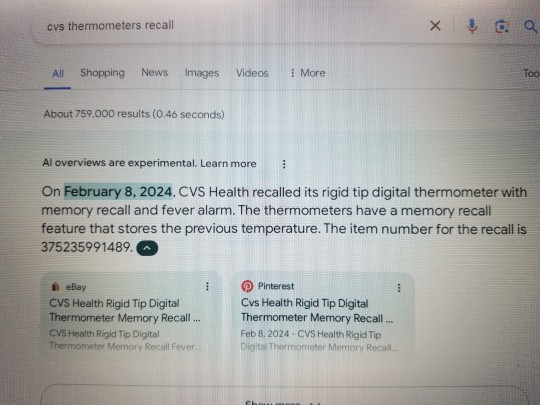
there is no record of this product recall. it did not happen. the date "feb 8 2024" is the date someone listed a thermometer for sale on ebay.
95K notes
·
View notes
Text
strips AI out of Google search results, giving you just the pages
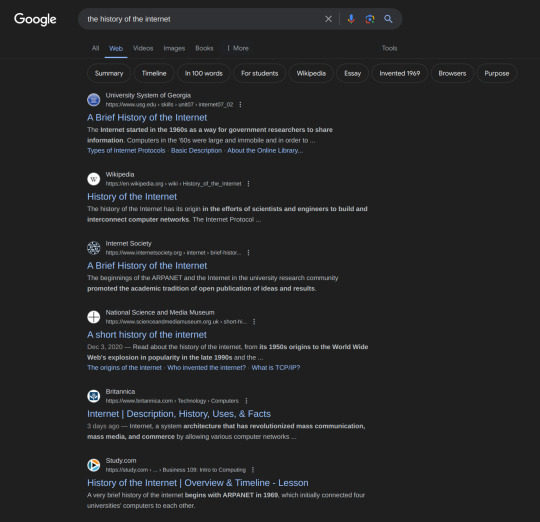
more info ⬇️
4 notes
·
View notes
Text
We bullied HP into a minor act of disenshittification

I'm on a 20+ city book tour for my new novel PICKS AND SHOVELS. Catch me TORONTO TOMORROW (Feb 23) at Another Story Books, and in NYC on WEDNESDAY (26 Feb) with JOHN HODGMAN. More tour dates here.

Here in the darkest days of the enshittocene, enshittification is low quality and plentiful, but even in this target-rich environment, one company stands out as pioneering champions of enshittification: HP.
Every page in the enshittification playbook was printed in farcically expensive HP ink, and if you try to run a copy off for yourself, the printer will stop five times and force you to print a "calibration page" that is solid color from top to bottom, consuming about $10 worth of ink. Don't like it? Die mad.
HP drips with contempt for its customers. They make printer-scanners that won't scan unless all four ink cartridges are installed and haven't reached their best-before dates. They make printers that won't print black and white if your $50 magenta cartridge is low. They sell you printers with special half-full cartridges that need to be replaced pretty much as soon as the printer has run off its mandatory "calibration" pages. The full-serving ink you buy to replace those special demitasse cartridges is also booby-trapped – HP reports them as empty when they're still 20% full.
HP tricks customers into signing up for irrevocable subscriptions where you have to pay every month, whether or not you print, and if you exceed your subscription cap, the printer refuses to work, no matter how much ink is left. Now, about those HP ink subscriptions. When the company launched them, they offered a pot-sweetener meant to tempt in the wary: a one-price "lifetime subscription" that would let you print 15 pages every month, for so long as you owned the printer. But a couple years later, all those "free ink for life" customers got an email telling them that they were being migrated to a monthly payment plan, and if they didn't like it, they could eat shit and throw away their printers:
https://pluralistic.net/2020/11/06/horrible-products/#inkwars
HP pioneered the use of copyright law to prevent third parties from refilling ink cartridges or making their own compatible cartridges. Section 1201 of Bill Clinton's Digital Millennium Copyright Act makes it a felony to distribute a "circumvention device" to bypass access controls on a copyrighted work. By designing its cartridges do undertake a little cryptographic handshake with the printer to verify their "authenticity," HP ensures that anyone who markets a bypass device to let you choose which ink you use in your own damn printer is a felon, liable to five years in prison and a $500 fine under DMCA 1201.
Of course, nature finds a way. Hardware hackers have come up with some insanely cool bypass devices for HP printer cartridges, like these paper-thin, flexible, adhesive-backed circuit boards that wrap around third party cartridges, intercepting communications between the printer and a salvaged HP security chip:
https://pluralistic.net/2024/09/30/life-finds-a-way/#ink-stained-wretches
But HP fights back, and they fight dirty. For example, they periodically push out "security updates" for their printers that break compatibility with third party cartridges. To prevent HP customers from discovering and blocking these fake security updates, HP designs them to lie dormant for months after installation, until everyone has clicked "OK," and then all those Manchurian Printers wake up and betray their owners by refusing to use their ink:
https://www.eff.org/deeplinks/2020/11/ink-stained-wretches-battle-soul-digital-freedom-taking-place-inside-your-printer
All of this has allowed HP to monotonically raise – and raise – and raise – the price of printer ink to the point where it is now the most expensive fluid a civilian can purchase without a permit. Printer ink now runs over $10,000/gallon, meaning that you print out your grocery lists with colored water that costs more than the semen of a Kentucky Derby winner.
HP is truly the poster child for enshittification, and also, patient zero in the enshittification pandemic:
https://pluralistic.net/2021/02/18/ink-stained-wretches/#hache-pe
HP's enshittificatory impulses run wild. They hunt relentlessly for ways to make things worse for their customers in order to make things better for themselves. Last week, they came up with a humdinger, even by their own standards. They announced that people who called their customer service line would be subject to mandatory 15-minute waits, even if there was a rep who was free to talk with them:
https://www.theregister.com/2025/02/20/hp_deliberately_adds_15_minutes/
During this mandatory 15-minute wait, customers would be bombarded with a recorded voice demanding that they solve their problems by consulting HP's website and its awful chatbots. In a competitive market, businesses can contain their customer service costs by making better products. In a monopolistic market like the printer racket, companies can deliberately introduce maddening antifeatures to their products, and then fob off the customers who reach such a peak of frustrated rage that they resort to calling a customer support number on chatbot that will use its spicy autocomplete to hallucinate nonexistent drivers and imaginary troubleshooting steps.
When I saw this, I thought, whelp, that's HP all right. Shameless.
But they're not entirely shameless. Within a day of Paul Kunert breaking the story in The Register, HP had reversed its policy, citing "feedback" (a corporate euphemism that means "fury"):
https://www.theregister.com/2025/02/21/hp_ditches_15_minute_wait_time_call_centers/
This is a rare win for the forces of disenhittification and it deserves recognition. It turns out that in these Mangionean times, companies can actually be bullied into comporting themselves with marginally less sleaze and cruelty. It's especially noteworthy that this took place in the UK, where Prime Minister Kier Starmer has invited tech companies to pick Britons' pockets without fear of consequence, by firing the top competition regulator and replacing him with the former head of Amazon UK:
https://pluralistic.net/2025/01/22/autocrats-of-trade/#dingo-babysitter
Even in these degraded times, we can get these fuckers. When Sonos enshittifies its smart speakers, we can get its CEO fired:
https://www.theverge.com/2025/1/13/24342179/sonos-ceo-patrick-spence-resignation-reason-app
When Unity sticks its hand in the pockets of every game dev in the world, we can get its entire executive team shitcanned:
https://venturebeat.com/games/john-riccitiello-steps-down-as-ceo-of-unity-after-pricing-battle/
It doesn't always work. Enshittifiers rack up some Ws, and make bank even as they immiserate 500 million users (looking at you, Steve Huffman – the people have long memories):
https://en.wikipedia.org/wiki/2023_Reddit_API_controversy
But if we can bully the psychotic monsters who populate HP's Executive Row out of their enshittificatory plans, then it's worth trying it every time.

If you'd like an essay-formatted version of this post to read or share, here's a link to it on pluralistic.net, my surveillance-free, ad-free, tracker-free blog:
https://pluralistic.net/2025/02/22/ink-spattered-pitchforks/#racehorse-semen

#pluralistic#hp#enshittification#ai#chatbots#customer service#angry mobs#pitchforks#sonos#reddit#ripoffs#disenshittification#counting coup
559 notes
·
View notes
